|
|
|
Sort Order |
|
|
|
Items / Page
|
|
|
|
|
|
|
| Srl | Item |
| 1 |
ID:
137229
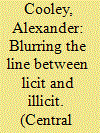

|
|
|
|
|
| Summary/Abstract |
The anti-corruption norm in both scholarship and the policy world has too narrowly focused on the domestic and institutional context of bribe-taking and public corruption. Instead, we argue that corruption in the contemporary global economy requires a multiple set of connected transactions, processes, and relationships that take place within informal transnational networks that blur the line between illegal and legal activities. These networks include multinational companies, elites in host countries, offshore financial vehicles and conduits, middlemen and brokers, and destination financial institutions. We examine how these actors operate in Central Asia, a region that is widely identified as corrupt, yet is rarely understood as embedded in the types of global processes, offshore connections and transnational links specified in our analysis. Examples of offshore centers in tax planning from Central Asia, and partial results from a field experiment based on impersonating high corruption risks from four Central Asian states, provide evidence for how the various actors in transnational financial networks structure their dealings. We then present two brief illustrative cases of how these transnational networks have operated in energy explorations services in Kazakhstan and telecommunications contracts in Uzbekistan. Our findings have theoretical, practical, and normative implications for scholars and practitioners of Central Asian international political economy and other ‘high risk' regions.
|
|
|
|
|
|
|
|
|
|
|
|
|
|
|
|
| 2 |
ID:
137236
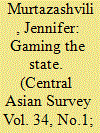

|
|
|
|
|
| Summary/Abstract |
The operation of a vibrant illicit economy and government corruption are widely acknowledged as obstacles to the post-conflict reconstruction of Afghanistan. However, massive influxes of money tied to the international efforts have led to ‘legal’ corruption that similarly obstructs state consolidation and peace. This paper considers the various ways in which Afghan entrepreneurs have learned to ‘game the state’ by taking advantage of donor and especially US procurement systems since 2001. The conceptual framework and evidence suggests that designing ways to limit corruption arising from the state-building process is key to improving the long-run prospects for post-conflict reconstruction in Afghanistan and similar states where rapid and steep increases in foreign aid and associated contracts create fertile ground for malfeasance.
|
|
|
|
|
|
|
|
|
|
|
|
|
|
|
|
| 3 |
ID:
137238
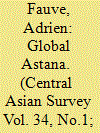

|
|
|
|
|
| Summary/Abstract |
This paper examines how, in post-Soviet Kazakhstan, both channels of elite and banal nationalism (such as sports and higher education) serve as instruments to promote the country. Through these channels, Kazakhstan is portrayed as an open, dynamic and successful country, an image which is in serious disjuncture with the authoritarian nature of the regime. Taking advantage of massive oil revenues, the government organized a significant OSCE general conference in 2010, while chairing the institution. In addition, it created the Astana professional cycling team, which rapidly became a world leader in the sport. Last but not least, Nazarbayev University, attracting prominent Western scholars, is now designed to make the country compete in the international arena of academic rankings. Domestic and international performances are thus treated as instruments to promote the legitimacy of the state at national and global levels. But this would not be possible without the help of individual actors who actively participate in this process. A close investigation shows that their social capital is based on global connections in various spheres (sports, finance and academia). This paper draws on evidence gathered through qualitative methods of enquiry (participant observation and semi-structured interviews). Finally, Astana is treated as a Latourian actor-network that has its own life and agency, thanks to the global association of various human actors and material objects.
|
|
|
|
|
|
|
|
|
|
|
|
|
|
|
|
| 4 |
ID:
137232
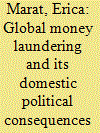

|
|
|
|
|
| Summary/Abstract |
This paper examines how Kyrgyzstan's two post-communist political regimes used offshore accounts to launder money and broker lucrative deals with international business partners. It argues that easy access to global financial institutions and availability of offshore markets strengthens a corrupt regime's grip on both political and economic matters and gives regime members a feeling of invincibility both domestically and globally. Offshore connections contributed to the emergence of a vast shadow economy inside Kyrgyzstan that includes clandestine hydropower exports, manipulations in the financial sector, and organized crime. The paper particularly focuses on the non-state actors who served as brokers to mediate connections between regime incumbents and international markets.
|
|
|
|
|
|
|
|
|
|
|
|
|
|
|
|
| 5 |
ID:
137227
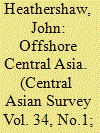

|
|
|
|
|
| Summary/Abstract |
For the first two decades of independence, most academics and policy analysts viewed Central Asia as detached from the global economy and immune to the diffusion of globalization trends. The apparent failure of ‘transition’ – allegedly manifest in high levels of corruption, elite control of critical industries and assets, and low levels of formal intra-regional trade – has been interpreted as further evidence of Central Asia's distance from the world economy and has led to new initiatives to bridge the gap. This is most evident in US State Department's recent vision of creating a New Silk Road that would increase trade and infrastructure linkages between Afghanistan and the Central Asian states.
|
|
|
|
|
|
|
|
|
|
|
|
|
|
|
|
| 6 |
ID:
137230
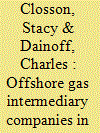

|
|
|
|
|
| Summary/Abstract |
Gazprom's utilization of offshore registration – or the moving of money across national boundaries for reasons other than of direct business benefit – has resulted in the creation of a web of subsidiary companies with opaque leadership and financial arrangements. Some of these subsidiary companies operate as intermediaries in the natural gas trade among the former Soviet states. Given that the gas trade within Eurasia has a long history of fixed contracts that move gas through a network of pipelines, why were intermediaries created, and why register them offshore? Using a critical reading of stateness as a space for transnational networks, and supported by mind-mapping software, we analysed the structure and operations of offshore gas intermediary companies between Russia and Central Asia dating from the break-up of the Soviet Union. We conclude that there were several purposes for using intermediary gas companies, from navigating trade among the newly independent states, to asset stripping, monopolizing markets, and obfuscating finance and ownership. However, the usefulness of intermediary companies to Gazprom may have expired, as a confluence of increased competition among suppliers, diversification of export routes, and economic stagnation has led to exporters and importers calling for their end.
|
|
|
|
|
|
|
|
|
|
|
|
|
|
|
|
| 7 |
ID:
137233


|
|
|
|
|
| Summary/Abstract |
Unlike the eponymous hero of the Kyrgyz epic, Manas, who united the Kyrgyz people, the American air base situated at Kyrgyzstan's Manas International Airport became a source of fracture in Kyrgyz politics after its establishment in late 2001 to support the US-led war in Afghanistan. Whilst international attention focuses on the geopolitics of a so-called New Great Game over basing rights in Central Asia, a more significant political and economic struggle concerning the Manas Air Base is related to its fuel supplies. The air base became a source of rent for the ruling elites and an object of controversy between the government and opposition in two successful uprisings, which removed presidents Askar Akayev and Kurmanbek Bakiyev from power (in 2005 and 2010, respectively). The air base's secret fuel contractors, with their unknown beneficiaries, offshore registration and low visibility, built close links to the regimes of the two ousted presidents. The lucrative and illicit contracts and subcontracts were purportedly used by both presidents and their entourages for personal enrichment and to strengthen their regimes but were ultimately a factor in their downfall. Drawing on the results of recent congressional and non-governmental investigations and interviews with representatives of the fuel-supply companies and members of the former regime, this work assesses the role of the US Manas Air Base in regime security and rent-seeking schemes during the Akayev and Bakiyev tenures. Thus, this article will contribute to the growing literature on rent-seeking in Eurasia's hybrid regimes and the external dimensions of regime security.
|
|
|
|
|
|
|
|
|
|
|
|
|
|
|
|
| 8 |
ID:
137237


|
|
|
|
|
| Summary/Abstract |
The inability of the state to maintain security and the rule of law for the purposes of foreign direct investment and industrial production is often taken as a sign of its weakness. However, such judgments say little about the actual functions of the state for global extraction industries and local political forces which demand their share of the pie. Whilst coercive state power may have decreased since Kyrgyzstan became independent, more important is the fact that the state itself has been transformed under the ruptures of, on the one hand, economic and political liberalization and, on the other, the effects of so-called ‘revolutions' of 2005 and 2010 which led to the wholesale restructuring of national structures of clientelism. Based on ethnographic research conducted in Talas province, documentary sources and interviews with gold mining companies and state officials, the paper investigates the state's shifting roles with respect to Kyrgyzstan's gold mining sector. Firstly, it explores the state as a source of rents for officials who grant and rescind licences in exchange for formal and informal payments from foreign investors, often via offshore vehicles. Secondly, it considers the role of the state as mediator between foreign investors and their access to sites. Finally, it identifies the state as performer of its status as sovereign power despite its inability to prevent uprisings and actually guarantee the promised access to its territory.
|
|
|
|
|
|
|
|
|
|
|
|
|
|
|
|
|
|
|
|
|